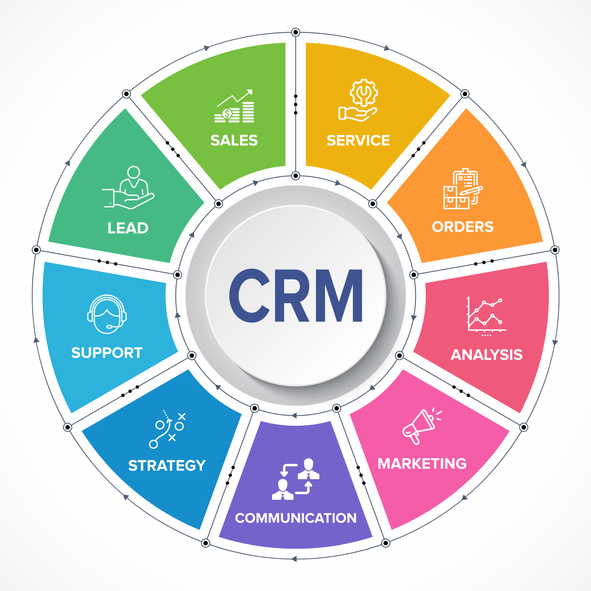CRM is the acronym for Customer Relationship Management. It is mostly used to refer to software systems that enable businesses to organise, manage and track their relationships with customers.
But does your business really need one? Are there alternatives to a CRM? And if you do want a CRM, how can you find the right one for your business?
What does a CRM do?
A CRM enables your business to store all information about customers and leads in one place. Everyone in your business who interacts with a customer can view details of all other interactions so far, and can update the customer’s record with details of their own interactions.

Marketing communications can be tracked, for example to see if a customer has opened an email or if a call or meeting has been arranged and/or taken place. Tasks can be set to follow up customers at a particular time. And deals can be opened for engaged customers to track their progress along the sales funnel.
CRM settings can be tailored for the needs of your business, for example in terms of the types of information stored and also access permissions. This helps to ensure that everyone can see and amend information for which they are responsible, but others who don’t need to know that information don’t have access to it.
A robust CRM can also either generate automatic communications with customers, or integrate with other systems you use to do that. It is also possible to build a library of marketing and sales information within your CRM to send quickly and easily to interested parties.
Five benefits of a CRM
Different business will use their CRM in different ways, but here are five of the main benefits across the board:
-
All your customer data is together in one place
Your CRM can become the beating heart of your company. It will need to be fed and nurtured . . . the old adage of “garbage in garbage out” still applies! You will need to train and encourage everyone in your business to faithfully enter details of all their customer interactions, and update changes to customer details. If you can do this, your CRM will contain a wealth of accurate and helpful information that will enable you to do things better.
-
More effective lead nurturing
Leading on from the above, a CRM is invaluable in making your lead nurturing more effective. It prevents silos. No more cases of the left hand not knowing what the right hand is doing. Anyone interacting with a lead will be able to check what has already been said and done, and will be able to build on it rather than duplicating it or causing confusion.
-
Streamlined sales funnel
A CRM enables you to create and monitor a step-by-step sales process to help customers efficiently through the sales funnel. Most CRMs also have an option of creating a deal through which customer progress can be tracked, and monetary values recorded.
-
Improved customer experience and retention
The cumulative effect of all the above benefits is that your customers are given a much improved experience because of your CRM. You have up to date information about them, which eliminates irritating errors. Everyone is aware of their latest interaction with your brand, and also the products, services and approaches that have had the most impact so far.
And if customers are enjoying a positive experience with you, this should also lead to increased customer loyalty and retention.
-
Detailed analytics
Another major benefit of a CRM is the detailed analytics it can provide. For example:
- Prospect activity and its effectiveness;
- New leads from a particular source, campaign or timeframe;
- Email bounces, opens and replies;
- Website click throughs and engagement;
- Customer engagement with events and offers;
- Customer purchasing patterns;
- Customer demographics and segmentation.
The above information can help you to tailor marketing campaigns to make them more effective. Many CRMs also generate automated sales reports to help you identify key trends and set goals and metrics for future sales cycle performance.
Five of the best CRMs
There are many CRMs on the market, and we would advise doing your research to find the one that is best for your business. But you could get this research off to a good start by investigating five of the most popular CRMs:
Describes itself as “powerful, not overpowering”. Hubspot originally focused on inbound marketing and now offers excellent CRM tools, split between marketing, sales, service and CMS. It also has a good reputation for ease of integration with other systems.
Describes itself as “simple to set up and easy to use”. Can be easily tailored to meet the needs of your business, and is able to connect to an impressive array of other tools including Google Drive, LinkedIn, OneDrive, Teams and Zoom.
Describes itself as “the all-in-one sales platform for growing revenue”. Designed by salespeople, for salespeople, Pipedrive is easy to use, fully customisable, and focuses on sales processes and activities.
Describes itself as “Your Life’s Work, Powered By Our Life’s Work”. Zoho offers a wider range of tools including a complete CRM platform, plus email, finance, meeting/chat, and its own creator application development platform – to name but a few.
Describes itself as “The No. 1 Customer Relationship Management tool for small, medium, and enterprise businesses”. Salesforce is one of the oldest names in the CRM world and remains a popular choice. It has many CRM modules, including marketing, sales and customer support.
Alternatives to a CRM
After reading all the above, you may still not be convinced that you need a CRM, especially if you are a small company.
But what are the alternatives? You may use spreadsheets, or perhaps have a custom-built database for your customer information. Or you may want to try using other off-the-shelf software for storing this information.
Whilst such systems are certainly one way of operating, they do not lend themselves to robust business growth. Nor do they have all the functionality and analytics that would be provided by a CRM.
The choice is yours. But we would recommend that if you want your business to grow, and want to be able to track progress and provide a consistently high quality customer experience, you would be much better placed to do this with an effective CRM.
